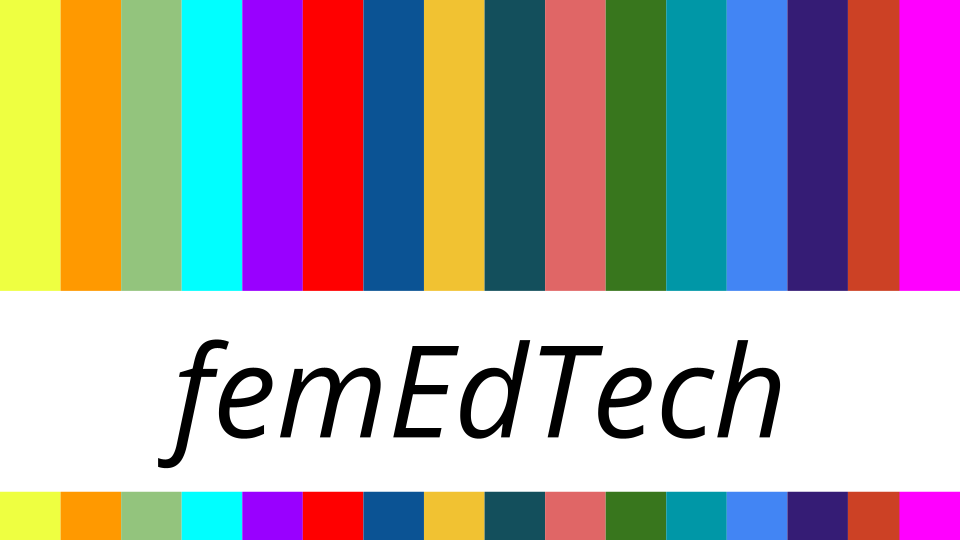and other references…
These references were compiled from contributions to the #femedtech hashtag and from presentations to OER19 and ALT-C19. Most of them are freely available (depending on your institutional status). Please use the [comment] function to suggest more. [@helenbeetham, Sept 2019].
Arruzza, C., Bhattacharya, T. and Fraser, N. (2019) Feminism for the 99%: A Manifesto (open book)
Bayne, S. (2015) What’s the matter with ‘technology-enhanced learning’?Learning, Media and Technology (journal)
Beetham, H. (2019), Education Technology: a feminist space? (blog post)
bell hooks (1994) Teaching to Transgress: education as the practice of freedom (open access book)
Feminist theory: from margin to centre (wikipedia page)
Bouterse, S. and Sengupta, A. (2018) Decolonising the Internet: summary report (open access report)
Campbell, L.M., (2018), The Soul of Liberty: Openness, Equality and Co-creation, Open World (blog post)
Coate, K. & Howson, C.K. (2014). Indicators of esteem: Gender and prestige in academic work. British Journal of Sociology of Education (journal)
Damarin S.K. (1991) Feminist Unthinking and Educational Technology, Educational and Training Technology International (journal)
D’Ignazio, C. and Klein, L. (no date) Our Values and Our Metrics for Achieving Them (online resource)
Dobele A., & Rundle-Thiele, J. (2015). Progression through Academic Ranks: A Longitudinal Examination of Internal Promotion Drivers, Higher Education Quarterly (journal)
Drumm, L., Bell, F. and Mycroft, L. (2019), But what exactly is #femedtech? OER2019 (conference paper)
Eubanks, V (2018) Automating Inequality: How High-Tech Tools Profile, Police and Punish the Poor. St Martin’s Press. [Link to book review by @_LouiseRP]
Faith, B. (2018) https://www.genderit.org/feminist-talk/why-we-need-‘feminist-digital-economics’Why we need a feminist digital economics (blog post for GenderIT.org)
Feminist Internet (2019) Designing a feminist Alexa (open book).
Leavy, S. (2018) Gender Bias in Artificial Intelligence: The Need for Diversity and Gender Theory in Machine Learning (open article)
MacNeill, S. (2018), Open Chasms – definitions dividing or uniting the open community? Some thoughts from #oer18. (blog post from howsheilaseesit.net)
Keller, J., Mendes K. and Ringrose, J. (2018) Speaking ‘unspeakable things’: documenting digital feminist responses to rape culture, Journal of Gender Studies (journal)
Michie, L, Balaam, M., McCarthy, J., Osadchiy, T and Morrissey, K, (2018), From Her Story to Our Story: Digital Storytelling as Public Engagement Around Abortion Rights Advocacy in Ireland, CH2018 (conference paper).
Mycroft, L. (2018) FAB model of digital resilience (online resource)
Noble, D.F. (1998) Digital diploma mills: the automation of higher education (online resource)
O’Neill, C. (2016) Weapons of Math Destruction: how big data increases inequality and threatens democracy (book). Link to wikipedia page.
Savonick, D. (2018) Why I teach with HASTAC: Platforms as critical pedagogy (blog post)
Scott, E. (2016) A brief history of cyber feminism (blog post)
Shah, N., Sneha, P.P and Chattapadhyay, S. (2018) Digital Activism in Asia Reader – especially chapters by Albornoz and Sarkar (open access book)
Stewart, B. (2019) Digital pedagogy in an age of algorithms (slideshare – see also Bon’s blog)
Turkle, S. (1995) Life on the Screen: Identity in the Age of the Internet (1995)
UNESCO (2019) I’d blush if I could: closing gender divides in digital skills through education (online report)
Webb, C. (2019) How a feminist approach to design is the key to tackling bias in AI (blog post)
West, S.M., Whittaker, M. and Crawford, K. (2019). Discriminating Systems: Gender, Race and Power in AI (open report)
Watters. A. (2018) The stories we were told about education technology (blog post from Hack Education)
Zuboff, S. (2019) Surveillance Capitalism and the Challenge of Collective Action (online article linked to her book of the same name)

Provide Feedback